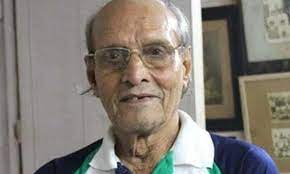 agencies agencies
KOLKATA, Aug 20: Former India football team captain Samar 'Badru' Banerjee, who led the country to a historic fourth-place finish in the 1956 Melbourne Olympics, died here in the early hours of Saturday after a prolonged illness.
He was 92. Banerjee is survived by his daughter-in-law.
Fondly known as 'Badru Da', he was suffering from Alzheimer, Azotemia and high-blood pressure related ailments, and was admitted at the MR Bangur Hospital after testing positive for COVID-19 on July 27.
"As his health deteriorated he was shifted to the state-run SSKM Hospital under the supervision of state sports minister Arup Biswas. He breathed his last around 2.10am," Mohun Bagan secretary Debasish Dutta told PTI.
"He was our beloved 'Badru Da' and we had bestowed him with the Mohun Bagan Ratna in 2009. It's another big loss for the Maidan," he added in his condolence message.
His body was brought to the club as the members and fans paid their last respects.
The Indian football teams have participated in three Olympics so far and till date, the performance by the Banerjee-led 1956 side remains the best, when it finished fourth after losing to Bulgaria 0-3 in the bronze medal playoff, in what was known as the 'golden era' of football in the country.
Having got a walkover in the first round, the Syed Abdul Rahim-coached side that also had the likes of PK Banerjee, Neville D'Souza and J 'Kittu' Krishnaswamy, defeated Australia 4-2. D'Souza struck a hat-trick in their glorious win.
But the team failed to make the final, going down 1-4 to Yugoslavia in the last-four stage.
The All India Football Federation (AIFF) condoled the death of the renowned player.
"It's sad to hear that Badru-da, one of India's greatest footballers, is no more. His contribution to Indian football will never be forgotten. I share the grief," said AIFF acting general secretary Sunando Dhar.
"He will stay synonymous with the golden generation of Indian Football. Badru-da, you will remain alive in our hearts," Dhar added in a statement.
As a mark of respect, a one-minute silence will be observed in the Durand Cup matches in Imphal and Kolkata on Saturday.
Besides guiding Mohun Bagan to several trophies including their first ever Durand Cup (1953), Rovers Cup (1955), Banerjee has also won the Santosh Trophy twice as a player (1953, 1955) and once as coach (1962). He also served India as selector.
With his demise, Maidan has lost another footballing great after the likes of PK, Chuni Goswami, Subhas Bhowmick and Surajit Sengupta in less than three years.
Born on January 30, 1930, Banerjee's footballing journey started with some local clubs in Bally as a school-going kid. |
